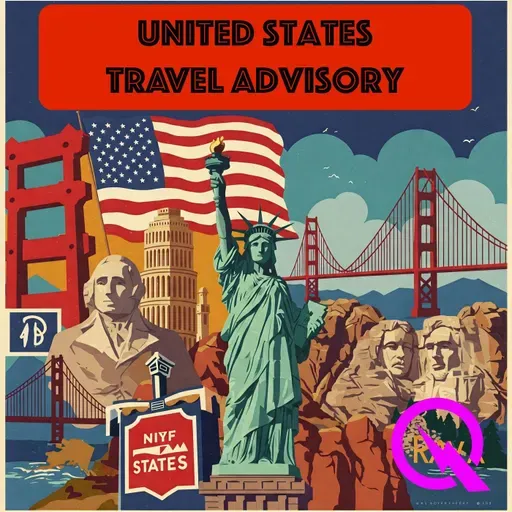
17 September 2025
US Travel Advisories Highlight Global Risks in 2025 Key African and Middle Eastern Destinations Remain Dangerous
United States Travel Advisory
About
Listeners considering travel to or from the United States in September 2025 should closely monitor both U.S. Department of State travel advisories and evolving global events. According to Travel and Tour World, September 2025 brings several significant updates to advisories, reflecting ongoing volatility in certain destinations. The Department of State issues four levels of travel alerts: Level 1 for normal precautions, Level 2 for increased caution, Level 3 for reconsidering travel, and Level 4 for do-not-travel warnings.
For listeners planning to travel to Africa, recent reports from AOL highlight that the State Department, as of mid-September, advises against travel to 16 African countries. Level 4 ‘Do Not Travel’ warnings are currently in place for Burkina Faso, the Central African Republic, Mali, Libya, Somalia, South Sudan, and Sudan. Level 3 ‘Reconsider Travel’ warnings have been issued for Burundi, Chad, the Democratic Republic of the Congo, Ethiopia, Guinea-Bissau, Mauritania, Niger, Nigeria, and Uganda. This uptick in advisories is attributed to threats including armed conflict, civil unrest, terrorism, and kidnapping.
Travelers should also note that advisories for other global destinations have shifted as well, with regions like Haiti, Afghanistan, Iran, Russia, and parts of the Middle East remaining at Level 4, indicating the highest risk, as shown on the State Department's official travel advisories page. Nepal, Guyana, Niger, and Nigeria have recently seen their advisories raised to Level 3, urging reconsideration due to instability, crime, or terrorism threats.
For areas with Level 2 advisories, such as Italy, Thailand, Jamaica, Kenya, South Africa, and Morocco, the guidance is to exercise increased caution. Issues range from petty crime and health concerns, to sporadic civil unrest. Destinations like Thailand and Cambodia, despite notices of caution, continue to attract tourists, provided visitors remain alert and prepare with comprehensive insurance and up-to-date information.
International travel continues to expand, but Washington’s advisories stress the need for vigilance and advance planning. Listeners are encouraged to review warnings regularly, register their travel with the U.S. embassy when overseas, and obtain travel insurance covering medical emergencies, trip interruptions, and unexpected political developments. The situation can change quickly, so monitoring country-specific news and updates from the State Department offers the best chance of a safe, seamless journey.
In summary, the U.S. government’s current posture in September 2025 is shaped by regional instability, health concerns, and terrorism risks. Travel advisories are sometimes updated on short notice, reflecting emerging developments worldwide. Listeners planning international trips should take these warnings seriously, adapt their plans as necessary, and consult reliable sources for the latest information before departure.
This content was created in partnership and with the help of Artificial Intelligence AI
For listeners planning to travel to Africa, recent reports from AOL highlight that the State Department, as of mid-September, advises against travel to 16 African countries. Level 4 ‘Do Not Travel’ warnings are currently in place for Burkina Faso, the Central African Republic, Mali, Libya, Somalia, South Sudan, and Sudan. Level 3 ‘Reconsider Travel’ warnings have been issued for Burundi, Chad, the Democratic Republic of the Congo, Ethiopia, Guinea-Bissau, Mauritania, Niger, Nigeria, and Uganda. This uptick in advisories is attributed to threats including armed conflict, civil unrest, terrorism, and kidnapping.
Travelers should also note that advisories for other global destinations have shifted as well, with regions like Haiti, Afghanistan, Iran, Russia, and parts of the Middle East remaining at Level 4, indicating the highest risk, as shown on the State Department's official travel advisories page. Nepal, Guyana, Niger, and Nigeria have recently seen their advisories raised to Level 3, urging reconsideration due to instability, crime, or terrorism threats.
For areas with Level 2 advisories, such as Italy, Thailand, Jamaica, Kenya, South Africa, and Morocco, the guidance is to exercise increased caution. Issues range from petty crime and health concerns, to sporadic civil unrest. Destinations like Thailand and Cambodia, despite notices of caution, continue to attract tourists, provided visitors remain alert and prepare with comprehensive insurance and up-to-date information.
International travel continues to expand, but Washington’s advisories stress the need for vigilance and advance planning. Listeners are encouraged to review warnings regularly, register their travel with the U.S. embassy when overseas, and obtain travel insurance covering medical emergencies, trip interruptions, and unexpected political developments. The situation can change quickly, so monitoring country-specific news and updates from the State Department offers the best chance of a safe, seamless journey.
In summary, the U.S. government’s current posture in September 2025 is shaped by regional instability, health concerns, and terrorism risks. Travel advisories are sometimes updated on short notice, reflecting emerging developments worldwide. Listeners planning international trips should take these warnings seriously, adapt their plans as necessary, and consult reliable sources for the latest information before departure.
This content was created in partnership and with the help of Artificial Intelligence AI